
I jumped into the world of freelance marketing purely by chance. Actually, I didn’t even choose it.
I was pushed into it by a series of “unfortunate” events that—in retrospect—I’m extremely thankful for.
I’ll admit upfront—the story is a bit sappy. But I’ll try to tell you the story without glorifying the details.
It began in September 2019, when I was working with a “Unicorn startup” as a content marketer for a little over 1.5 years.
I was happy doing what I was doing in that cushy job, except that it was rote and I wasn’t learning much.
I was just another corporate drone taking marching orders from other, more experienced marketers.
I was used to being told “no” to almost every idea I presented. But I enjoyed the free office food and had made a few friends along the way.
One fine day, a close colleague gave me a lead about an “exciting” job opportunity (her words, not mine) in an up and coming startup.
It was a cybersecurity company her husband worked at, and they were looking to hire marketers to improve their organic footprint.
Honestly though, I wasn’t interested in it for a few reasons:
1) I had never even heard of them before
2) Their website didn’t make an impression on me (frankly, it sucked)
3) They had zero marketing presence
I ignored the lead despite her bringing it up a few times again. She knew I had worked in another cybersecurity company a few years back, and she thought I fit the bill quite well.
Oh, and her husband would get fat, $2000 referral bonus if I was confirmed. So maybe that was that, too.
She had also mentioned that the CEO (also the company co-founder) was unhappy with the way marketing was done in the company and I had a good shot at making things happen directly under the CEO.
I told her that I wasn’t sure, but I will send them my profile anyways. Put simply, I was pretty smug about the whole affair.
But you know what scrapes a marketer’s ego better than anything?
Higher pay? Yes, to an extent. In my case, that wasn’t a deal clincher yet because I didn’t know how much more they were willing to pay.
I decided to take the job after the CEO of the company called me and told me this:
“As our first marketing hire in India, you will own the end to end process of coming up with new ideas, executing marketing campaigns, and later building a team of able marketers like you.”
Now that got me excited!
I always saw myself as an intrapreneur in my previous jobs.
However, I never had the full ownership of running a show on my own because I always dealt with bossy middle managers who liked bottlenecking decisions with them.
So I immediately had a change of heart after talking to the CEO who called me all the way from his company HQ in the Southwest U.S. at MDT 9:30 pm on Friday morning.
Two days later, I sat across the table with the company’s HR who offered me a 100% raise to my current salary.
I was already mentally prepared to take the job and that discussion with HR cemented the deal even further.
So you see, everything was hunky-dory and I thought I had found the best job of my life.
I joined the startup in the first week of October and gave it my best shot.
I spent the next two weeks getting to know the product and the competition around us.
I created a kickass content calendar, built a social media marketing strategy, and curated several ideas to help the company market itself better.
I had some of the best sleepless nights of my life back then.
Once I was done, I presented the quarterly marketing plan to my CEO and explained each strategy to him in a non-marketing lingo.
He came from the cybersecurity background and—although he understood marketing—he insisted on getting briefed in terms of ROI and outcomes.
And I did just that. I communicated what results to expect—and the estimated time it would take for us to get there—for each plan I made to market the brand.
He ran my ideas with his closest people in the leadership team and it got them excited too.
I know this because one day, out of the blue, one of the founding members of the company called me in his office cabin and asked me to repeat the marketing plan to a few people in his team who reported to him.
The CEO also called me a few times during the last week of September and thanked me for the elaborate plan. He said he was “impressed” with my work and asked me to reach out to him directly if I needed any help.
Those were great validation for me and I thought I had made it. I had found the job I had been waiting for all my life. It was just a matter of time before I could start executing my plans and get results.
The CEO just had one request though.
He asked me to run the ideas by the VP of Marketing and get them approved by him. To keep his identity anonymous, we’ll call him John Doe.
I had been introduced to John during my job onboarding and he had passed along some marketing assets my way for me to go over it. He was also not part of the job interview to hire me.
And for some weird reason, the HR told me that I wouldn’t report to John, but the Head of Product who had also joined the company a few months back.
I thought that was really weird, but I didn’t think much about it.
The CEO told me I should start executing my marketing plans once I had the buy-in from John, you know—so that I didn’t step on his toes.
And I thought, “Sure, no problem.”
I had gotten past non-marketers to agree with (and excited about) my plan, so I was confident about getting a marketer to give it a go-ahead.
But, like most things in our lives, it wasn’t as easy as I expected at first.
I spent the entire next month playing email ping-pong with John. He would neither approve the quarterly marketing plan that I presented him, nor approve it.
When I pestered him for not having anything to work on, he gave me a few trivial tasks—such as drafting a cold email template and updating an existing marketing datasheet.
I did with enthusiasm although most of the tasks he gave me were data entry jobs.
I had had my share of difficult managers in the past, so I thought fulfilling these tasks would earn me his confidence.
But I guess I was wrong.
I sent him follow-ups after follow-ups to set up a meeting, but he either replied to my emails in vague terms or asked me to remind him of it after a few days.
John had worked in marketing for the last 30 years of his life.
“I’ve been described as a product-focused marketing guy or a market-focused product guy,” says the first line of his LinkedIn bio.
And yet, in one of his replies to my follow-up email, he asked:
“Do you think online ads will work for us?”
To that, I thought, duh.
I might have taken that question seriously had it not come from a non-marketing person or if he had justified his question with a supporting argument on why he thought so.
But he didn’t, and it looked like a trick question to me.
I remember thinking to myself, “Maybe he is testing me?”

So I sent him a response with all the data points that explained online ads work for all businesses big and small, regardless of whether you’re trying to be elected as the world’s most powerful person or if you’re in the business of selling horse carts to the Amish.
I started being skeptical of his intentions after that email interaction, although I did give him a benefit of doubt thinking:
“Perhaps he has a good reason to believe that ads might not be a good fit for cybersecurity companies.”
But all my research pointed in the opposite directions. I mean not one, not two, but all the data I found are positively conclusive about this.
Besides, John also didn’t have any response to all the other ideas I had included in my plan that weren’t about online ads.
And he also didn't refute my findings about the roaring feasibility of running ads to market our brand.
To cut a long story short, I heard nothing but crickets for the next 2–3 weeks.
And for the entire period of three months that I was with this company, John deliberately deprived me from having access to all marketing-related platforms that they used, such as WordPress, Marketo, and Google Analytics.
Looking back at all these things, I feel like a fool to not see what was coming my way.
One fine morning, towards the end in December—right after an office outing in an adventure sports arena—the HR called me and told me to “start looking out.”
The HR personnel said that I wasn’t someone they expected to hire in that position and that they were folding up that position in India altogether.
It was the worst day of my work life. I had never been fired before. And to be fired for trying to do the right thing?
It made me feel sick in my guts.
I tried to push back. I told the HR that I deserved a fighting chance to prove myself. They couldn’t lay me off for something I hadn’t even given a chance to perform.
I told them I wanted to talk to the CEO, who had gone incommunicado with me for the last few days.
But the HR said the decision had been made (by the board) and I was not to come to the office starting the next day.
I was consumed with anger the whole day that day. But when I started analyzing everything when I couldn’t sleep that night, it started making sense to me.
I have a few theories about John influencing my layoff for either of the following reasons:
He was insecure that a young marketer could steal his thunder in the company.
He wasn’t involved in hiring me. So this was his way of taking it out on the CEO.
He convinced the company board that I hadn’t done anything in the last three months except for warming my chair.
I hadn’t even spent three full months with this company and I did everything in my capacity to prove my mettle.
I mean, what company hires a content marketer and not let him have access to their content management system? It's like hiring a sculptor to sculpt a statue without giving him a chisel and a hammer.
The fact is—they decided to fire me because of some mysterious behind-the-curtain politics between the CEO and the VP of Marketing.
I became a mere scapegoat in the ego battle of two top cats in the proverbial tenth floor.
I’m not mad anymore though, because being fired from that job opened doors of opportunities and freedom that I never knew existed.
I immediately started looking out for full-time opportunities to make sure I wouldn’t stay unemployed before my 15 days notice period ended.
But I didn’t find anything for the next 15 days.
One day, out on a whim, I made a recap post on LinkedIn inspired by Spotify’s 2019 Wrapped campaign.
I spoke about all the major things that I had gone through in 2019 and one of them talked about being laid off:

The post got decent engagement and a few people messaged me expressing their sorry for what had happened to me.
But something unexpected happened too.
I received a few DMs from strangers asking me if I was willing to work for them as a freelancer.
To be very honest, I didn’t think I was ready for freelancing. But desperate to find a source to feed my family, I took the plunge.
And that, my friends, is how I met my fate in freelance marketing.
Now if you are interested in knowing the kind of freedom and better lifestyle freelancing has led me into, you should check out this guest blog.
The End.




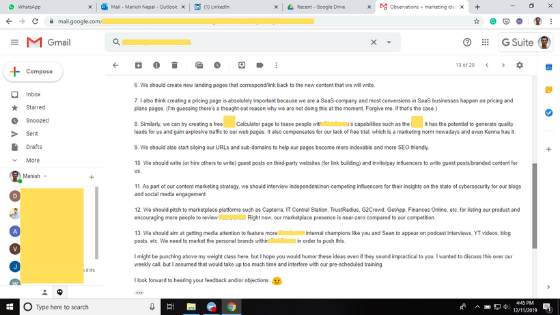



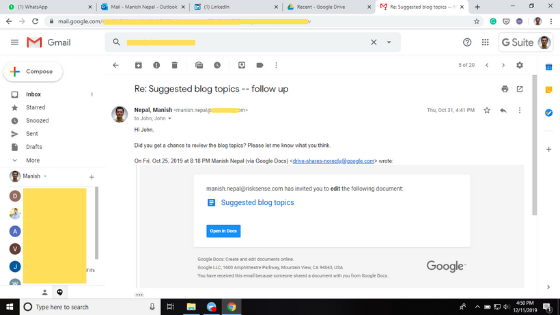

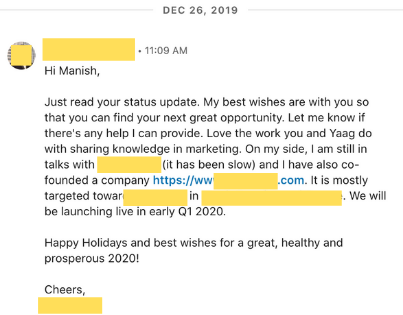

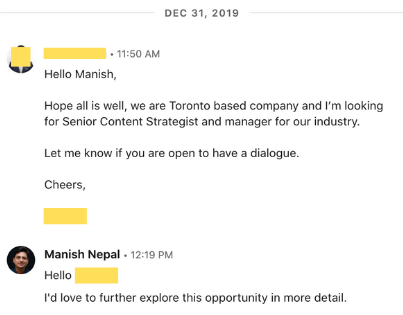



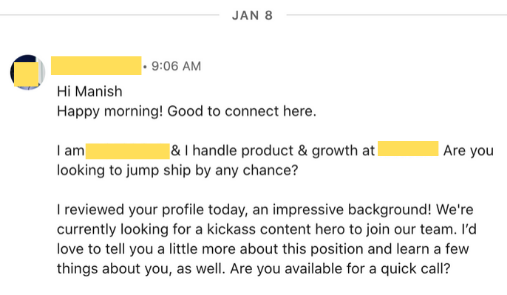
Commentaires